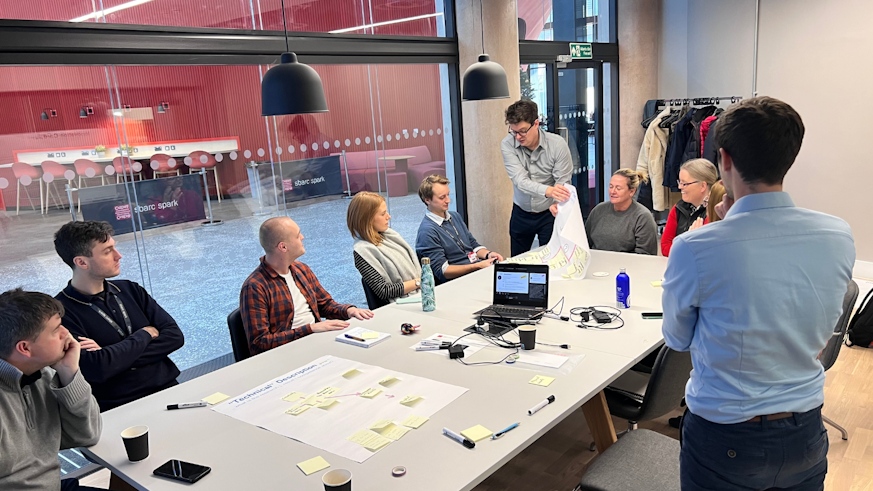The Case: research impact and innovation training
17 February 2023

Cardiff University is the third university in Europe to take part in The Case, an Arts, Humanities and Social Sciences focused training programme. We found out more about The Case by speaking to Sophie Bruford, ESRC IAA Impact Manager, who organised the training…
About The Case
The Case is a bespoke capacity-building course for achieving impact and innovation from Arts, Humanities and Social Sciences (AHSS) research. It is about application-oriented learning: participants utilise acquired knowledge instantly by working on a specific real-world case from their own university.
The training programme at Cardiff University
A group of Cardiff University academics took part in The Case over three days in December 2022 and January 2023. The training featured interactive workshops and two promising commercialisation projects. Academics involved included: Dr Andrea Collins, Dr Nicole Koenig-Lewis, Dr Daniel Finnegan and Dr Esther Wright. They worked collaboratively with colleagues in the Research Commercialisation and Impact team as part of the programme.
The workshops provided vital knowledge about the AHSS-transfer and impact methodologies to accelerate projects to impact at scale, culminating in a well-developed case with clear forward direction along a commercial pathway. Teams explored commercialisation through both for-profit and not-for-profit organisational structures, with both teams aiming for not-for-profit models.
During the programme, participants utilised key entrepreneurship theory and tools to develop the projects, such as stakeholder mapping, gap analysis, market validation, value proposition, the use of business canvasses, and pitching. The project teams will receive ongoing support from the Research Commercialisation and Impact Team to help ensure progress along an impact pathway.

The cases worked on during the training:
Event Impact Toolkit
Dr Andrea Collins (School of Geography and Planning) & Dr Nicole Koenig-Lewis and Professor Max Munday (Cardiff Business School)
This project aims to contribute to a more comprehensive assessment of the direct and indirect carbon emissions generated by the travel and consumption associated with visitors attending national and international large-scale events e.g., sporting events, festivals, and major academic conferences. The event impact toolkit will be developed to provide solutions, case studies, and measurement tools to support the facilitation of sustainable behaviour change in event attendees, and ultimately lead to lower environmental impact at large-scale events.
Working with key stakeholders across government and event organisation bodies, waste reduction strategies and awareness campaigns will be developed to inform event organisers nationally and internationally how to deliver more sustainable events. This project builds on the success of several impact-generating projects led by the research team working with high-profile events and their organisers.
Heritage Console
Dr Daniel Finnegan (School of Computer Science and Informatics) & Dr Esther Wright (School of History, Archaeology and Religion)
This project aims to address the challenges faced by cultural heritage organisations, community groups, and third sector organisations when delivering sustainable, interactive media content which meets the need of the cultural heritage provider and their heritage consumers. By constructing a model whereby community members become stakeholders of their local heritage, the use of video games to create an interconnected hub of co-created content, developed with, not just for the community, who engage with their heritage can be leveraged as a familiar device with which to engage the public.
Through workshops with partners, the core concept of the project—a heritage console—will be developed by the cohort to create a console unique to each cultural heritage context, providing a rich and diverse expression of local heritage. The games are created and stored in the cloud platform, meaning they are accessible remotely via personal devices, or at specific venues housing a heritage console.
Participant feedback
Dr Andrea Collins said: “The Case training has been invaluable. The stages involved in completing our 'Research Impact Card' not only extended our thinking around current impact plans, but also the need to connect with wider stakeholders and capture impacts beyond the requirements of Research Excellence Framework (REF). The training has enabled us to realise the many potentials of our work on major events. We now have a strategy to take forward our impactful research with the support of the Research Commercialisation and Impact Team.”
Dr Nicole Koenig-Lewis said: “The training provided the space and structure to think more broadly about the impact of our different projects with major event organisers. It was extremely useful to co-design ideas together with the University Research Commercialisation and Impact Team during the workshops. The training was led by fantastic facilitators who sparked our enthusiasm and supported us in the development of a realistic vision on how to move forward to increase our impact.”
The training was organised by ESRC IAA Manager, Sophie Bruford, and made possible by funding from ESRC IAA and ESRC IAA CRoSS top-up funding, and AHRC IAA funding.
Please contact the Research Commercialisation Team if you are interested in exploring alternative pathways to impact via commercialisation: technologytransfer@cardiff.ac.uk

